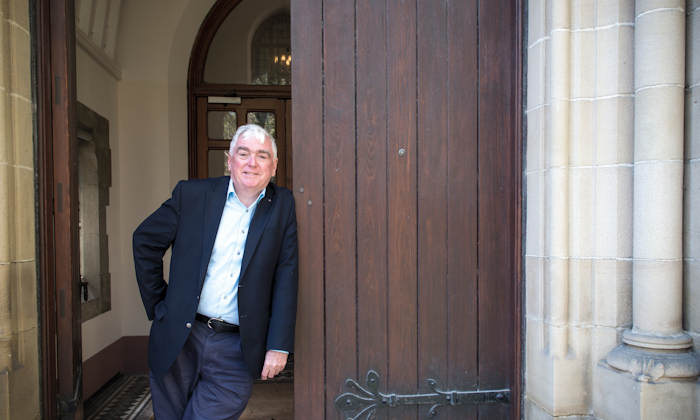A tale of two continents
20 Oct 2016
Two decades of changing lives in South Africa

Over the past two decades, Professor Paul O’Brien’s work has helped change the lives of many of South Africa’s young scientists. Here, both he and one of his first protégés look back upon this impact.
On a damp afternoon in March of this year, Professor Paul O’Brien visited Buckingham Palace to collect his CBE for his services to science and engineering. But the story begins in a much warmer setting.
“In Africa, Professor O’Brien has really inspired and helped so many scientists,” says Neerish Revaprasadu, SARCHi Chair of Nanotechnology and Professor of Chemistry at the University of Zululand (UNIZULU). “He’s very good at getting the best out of people.”
The seeds of international collaboration
Professor O’Brien’s tale is one of collaboration across two continents. He and Professor Revaprasadu first met in late 1996, when Professor O’Brien, then based at Imperial College London, visited UNIZULU as the UK project leader for a Royal Society programme that had just been set up to support the dawn of democracy in South Africa. The programme aimed to build excellence in teaching and research in historically black universities in Africa, with UNIZULU being one such institution.
“I had read about South Africa as a child and always wanted to visit,” says Professor O’Brien, “but I wouldn’t go until it was democratised”. In April 1994, his wish came true. South Africa held its first-ever general election with universal suffrage and appointed Nelson Mandela as its president, finally marking the end of apartheid in the country.
During the late 1970s, Professor O’Brien had helped to build a new university in the Portuguese city of Aveiro as part of a capacity-building project, an experience that made him optimistic that the Royal Society’s ambitious programme in Africa could work. When he was approached in 1996 to lead the Royal Society programme, he jumped at the chance.
Realising potential
At the time of their first meeting, Professor Revaprasadu was working as a senior lab technician in the chemistry department at UNIZULU. After immediately impressing Professor O’Brien, he quickly became the first exchange student to take part in the Royal Society scheme and flew to London in February 1997 to begin studying for a PhD at Imperial College.
“I was thrown in at the deep end,” explains Professor Revaprasadu. “I had never been overseas and I was worried about my ability to succeed. Once I started, I gained immense confidence through Professor O’Brien’s guidance and supervision. I was able to meet so many aspiring scientists during my stay in London and achieve my true potential.”
In 2000, Professor Revaprasadu became the first South African ever to receive a PhD in materials chemistry. “When I returned to South Africa I realised that I was quite unique in my field,” he recalls proudly.
The two have collaborated ever since, with Professor O’Brien maintaining his links with UNIZULU and South Africa. “Having an ongoing collaboration with Professor O’Brien helped me achieve the SARCHi Chair of Nanotechnology, which is a prestigious programme funded by the National Research Foundation in South Africa. I also became a full professor after ten years in academia,” says Professor Revaprasadu.
Professor O’Brien joined The University of Manchester in late 1999, bringing with him his strong ties with Africa. Many of Professor Revaprasadu’s students at UNIZULU have subsequently visited Manchester to work and study. “I guess one or two more Manchester United fans have also been created,” jokes Professor O’Brien.
The Royal Society programme ran for nearly 12 years in total and brought more than £700,000 of funding to South Africa, leading to 12 alumni holding substantive posts in academia or research. “The opportunity changed my life,” says Professor Revaprasadu. “Professor O’Brien is very well known in South Africa through his work with the Royal Society. He has changed the lives of numerous other students in Africa.”
A lasting legacy
Professor O’Brien was awarded UNIZULU’s first honorary DSc degree in 2006 after ten years of support work with the university. In addition to his CBE, this year he received the Royal Society of Chemistry’s (RSC) prestigious Longstaff Prize, which is awarded triennially to the RSC member who has done the most to advance the science of chemistry.
He has continued his efforts in South Africa, arranging for the Nobel Prize winner Sir Harry Kroto to visit the country, and becoming a founding member and adviser to the South African Nanotechnology Initiative.
Following his success with UNIZULU, Professor O’Brien was invited by the Royal Society to help to establish a similar project in Ghana and Tanzania. More recently, he obtained a new £1.15 million grant from the Royal Society and the Department for International Development for capacity-building projects in South Africa, Ghana and Cameroon.
Two decades on from his first meeting with Professor Revaprasadu, Professor O’Brien’s links with the continent of Africa are stronger than ever. “Professor O’Brien has done his country proud through his work in the sciences in Africa” says Professor Revaprasadu. Manchester agrees.
